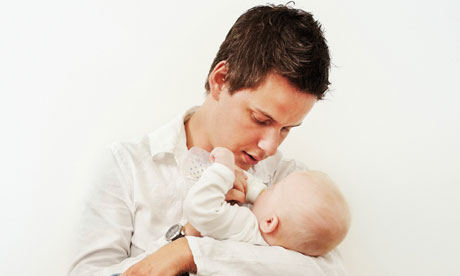
My second daughter was born five weeks ago and I was with my partner throughout the labour, until the moment she arrived. There were moments that were harrowing, and moments that were truly magical.
Seeing our baby take her first breath and cry her first cry was amazing, but I wasn't there just for the experience. I was there to make sure that my partner was OK, and to ensure she got the best care possible. I was there in the most painful moments to offer support, and make sure she knew that I understood what she was going through. I was there because, although as a father I can never do everything a mother can do (I can't breastfeed, for example, however hard I try), I believe in taking equal responsibility as a parent, and being there for the birth of our child was the first step towards that.
On Tuesday morning the England cricketer Jimmy Anderson was described as engaging in "advanced macho-man behaviour" by Frances Edmonds on Radio 4's Today programme simply because he flew back home from the Ashes contest in Australia to be present at his baby's birth. In turn, his England coach, Andy Flower, described the timing as "not ideal".
Meanwhile, the former Liverpool and England footballer John Barnes hit the news last month for remaining on set as a pundit during a televised football match, despite the fact that his wife was in labour at the time. And he was only a car journey away. Barnes got a lot of criticism – not least from his colleagues on the Sky show – but some support for his decision too.
It seems there's no clear consensus on what exactly a father should do. Which is strange, because research shows that being there for the labour not only benefits the father himself – it's good for the mother too.
A range of studies on the Fatherhood Institute website says that fathers attending childbirth leads to "high levels of satisfaction postpartum for both mothers and fathers in sharing the experience of labour and birth", and even that a father's presence has "been shown to help compensate for poor quality obstetric services". And: "one of three predictors of a young mother's positive childbirth experience was her perception of a positive attitude toward the pregnancy by the baby's father".
The importance of fathers being present during and after labour is further backed up by last week's Guardian article entitled "Torn apart by childbirth", by Joanna Moorhead – which managed to put me off not only my breakfast, but the idea of my partner going into the labour ward ever again.
The article revealed just how risky childbirth can be, and included horrific real-life stories, including those of women left incontinent for life through birth injuries. While injuries this severe are relatively rare, the view that men can take a passive role when a baby arrives (as was standard just a generation ago) ignores the fact that childbirth comes with immense risk. Personally, I can't imagine being utterly powerless, 24 hours away on the other side of the world as my partner went through this process. What happens if you're not there and it all goes wrong? What's the potential effect on your future relationship?
After the birth, there are also mixed opinions about paternity leave. After our baby's birth I took two weeks' paternity leave and a further three weeks of reduced working hours as we adjusted to looking after a newborn baby and our two-year-old at the same time. I'd describe that period of time as organised chaos – it was totally knackering. But we got through it together far more easily than my partner would have done alone.
However, on taking his full statutory paternity leave soon after becoming Labour leader, Ed Miliband was recently described as "a bit of a wuss" by the Guardian's Simon Hoggart. Whether or not you agree with Hoggart's view depends on whether you think it's solely women who should have responsibility for parenting (and remember, this was also their second child) or whether men should contribute too – no matter their job, wealth, or status in public life.
I personally found the idea that the Labour leader was weak in some way for being there deeply offensive. Not least because, in my experience, looking after children and babies – especially in those early days – is far harder than a day at work.
The fact is that too many people continue to view men as an optional extra – in the labour ward, during paternity leave, and in parenting from then on. This isn't only bad for men, but unfair on women too. Because what seems to be forgotten is that when the father isn't there, responsibility falls on the shoulders of mothers alone. And even as a man, I don't think that's fair.

